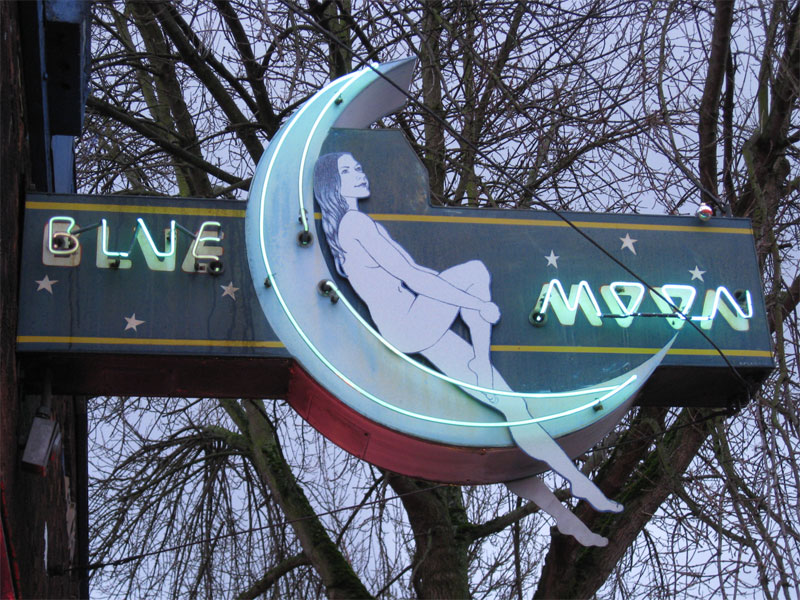
Moon Maid


Ever since he demonstrated an uncanny ability to portray the almost pathological obsessiveness of a certain type of male music fan in his novel “High Fidelity,” British author Nick Hornby has gone on to broaden the scope of his acute observation to include the frailties of marriage, the perilous borderland between childhood and young adulthood, and the bewildering moral minefield of the modern world.
In his latest novel, “Juliet, Naked,” Hornby weaves all of these themes into a compelling and immensely entertaining examination of a man’s obsessive interest in a reclusive rock musician, and how it unravels his life and marriage. Hornby’s portrait of Duncan calls to mind the almost painful excesses of devotion which the author revealed in “Fever Pitch,” his confessional memoir which detailed his lifelong love of football – the British version, what we in America call soccer. Hornby’s ability to empathize with characters who, for whatever reason, find their deepest connection to life through a kind of hero worship, allows him to make believable characters with whom the reader can sympathize.
“Juliet, Naked” exposes the kind of music fans who over-analyze every word and every recording of their idols, and the Internet-based communities who thrive on their own closed-circuit opinions. Hornby’s satisfying plot device takes off when Duncan’s long-time girlfriend Annie dares to post an opinion of her own on the website where he is considered to be the expert. The chain of events which follows sheds light on Duncan’s failure as an adult, and awakens Annie to the reality of the half-life she’s been willing to accept.
I have enjoyed all of Hornby’s novels. “About A Boy” – far superior to the film, and I liked the film a lot – “How to Be Good,” as thought-provoking as anything he’s done, and even “High Fidelity,” which is perhaps not as much fun as the movie with John Cusack (thanks in part to one of Jack Black’s finest moments), but nevertheless offers an astute assessment of the sort of man who ranks everything from songs to women in terms of “the top five.”
Anyway. If you are of a certain age you can’t help but relate to the story in “Juliet, Naked.” Many of us who grew up worshiping rock stars, imagining them as true artists with the ability to give voice to feelings we shared, have felt the letdown when those artists either lost their creative spark or revealed themselves to be only human.
But Hornby’s novel suggests that the value of great art lies not only in the passion with which it is created, but the passion with which it is experienced. And in that sense, “Juliet, Naked” offers a tonic antidote to idolatry.
I keep thinking about the Tsunami of 2004.
More than two hundred thousand people, most of them women and children, were killed in a matter of moments on December 26 that year, when a 9.3 magnitude earthquake off the coast of Indonesia triggered a massive killer wave.
It was all over the news for perhaps a month. And then it slipped into the past, for most of the world. In Indonesia the effects of the tragedy and the recovery efforts are still going on.
Now in Haiti, where at least one hundred thousand people have been killed by a powerful 7.0 earthquake, the vivid images of death and destruction are overwhelming. The urge to offer help is universal. Unlike the tsunami victims, most of whom were swept away, the dead lie in the streets of Haiti, where lack of infrastructure and resources is slowing even the most heroic efforts to bring relief and aid. The images of the dead and suffering survivors in Haiti are perhaps more dramatic than the photos of empty beaches of Indonesia. But once the rubble is cleared and the bodies are buried, I suspect even this horrific event will slip down in the news cycle.
It’s too much to take. Everyone does what they can. But if that’s not enough, what then?
Events on such a huge scale can lead to a feeling of powerlessness. And unfortunately the urge to blame rides shotgun in the rescue effort. But there’s no sense in blaming the victims, or religion, or the lack of it, for natural disasters.
All we can do is what the people in Indonesia, and New Orleans, and everywhere tragedy redefines the human landscape, must do. Pick up the pieces, help each other as best we can, and go on.
It doesn’t sound very heroic. But in real life, as in fiction, sometimes the only way to survive is to turn the page.
The Simpsons celebrates twenty seasons of satirical splendor tomorrow.
I’ll be tuned in.
Yet when it all started, more than twenty years ago, I had no time for television. I was working thirty hours a week at a newspaper in addition to taking college courses and raising three kids. Spare time was a fantasy.
Even so, The Simpsons seeped into my consciousness, in part because the half hour during which the show aired once a week was one of the only times my three children and their father would sit down and watch something together. The sound of them all laughing would float up the stairwell to the kitchen where I was cooking dinner. And that was good enough for me.
The Simpsons lexicon — Homer’s “d’oh!,” Nelson’s “hah, hah,” Flanders’ “okely dokely”, etc., crept into daily conversation. I knew what they looked like. I had a vague sense of the show’s skewed humor. But seriously, I had no idea how truly cool The Simpsons were until I got hooked on the reruns.
This was long after my kids had left home and gone out into the world to forge their own paths. That’s when the house got quiet. Too quiet. So, one evening, I turned on the tube and after flipping through the channels in vain for a few minutes I settled on The Simpsons. What the hell, I figured. My son had always urged me to give them a try. My daughters assured me I would like them.
How right they were. It didn’t take long for me to identify with Marge, to feel for Lisa, to forgive Bart for all his mistakes, and to love Homer in spite of his many flaws, because his heart is true. I make no mention of Maggie because, let’s face it, she’s an adorable baby; there’s no getting around it.
When I grew up, kids were expected to like cartoons. Saturday mornings were prime time. And the cartoons were lousy. No doubt there are people somewhere who thrilled to the antics of Tom and Jerry, Bugs Bunny and the Roadrunner. But I never saw the point of repeated gags about violence, greed and petty cruelty. The Simpsons’ “Itchy and Scratchy” segments are hard for me to watch only because they remind me of the inane antics that were provided as appropriate childrens’ fare in the late fifties.
The advent of more sophisticated shows like “Rocky and Bullwinkle” heralded a change in the culture, but there has never been anything like The Simpsons. In its ability to both mirror and mock the world in which we live, to inspire emotional connection without being sappy, and to provide insightful commentary on current issues, The Simpsons stands alone.
Here in Seattle, many locals point to the episode in which Springfield votes to build a monorail to boost its economy as an example of telling cultural criticism.
I’d be hard-pressed to pick a favorite episode. I’m not even sure if I’ve seen them all yet. But I think one of the Top Ten for me would have to be the episode titled “That 90s Show,” in which Homer starts a grunge band called Sadgasm after he thinks he’s lost Marge to a college professor.
I’m sure there will be college courses on The Simpsons in the future, if there aren’t already, and theses may be written on such tormented characters as Comic Book Guy and Moe the Bartender. But if I were still writing those kind of papers I could write a book about Marge. There’s a world of complexity underneath that blue tower of hair. As Homer put it so well in his timeless song “Margarine”: “Country churned girl in my grocery cart/ I paid for her dreams, she taught me to cry.”
Thank you, Matt Groening.
Forget RinTinTin. Forget Lassie. And weep no more for Marley.
In this bright New Year, my heart belongs to Tillman, the snowboarding, skateboarding, surfboarding bulldog extraordinaire.
I first saw Tillman skimming along on his skateboard a year or so ago in a video clip. Cute, I thought. Little did I know that millions of fellow Americans would share my fondness for the squat, chubby, daredevil pooch.Tillman the Wonder Dog
Seattle is full of dogs and it’s not uncommon here to see dogs going the extra mile to please. Some pull their owners along on skateboards, others accomplish acrobatic feats with Frisbees and whatnot. But I have yet to see any canine equal Tillman for sheer charm and entertainment value. So this morning, when I crawled out of bed with a dull headache to face the New Year, and went down to watch a bit of the annual Tournament of Roses Parade, I was delighted to see Tillman and three of his pals boldly sliding where no dogs have slid before, down a specially constructed record-breaking long float.
Man. I don’t know what it is about that dog. I have never had the slightest desire to snowboard myself, and I tend to feel that skateboarding is best left to those with a lower center of gravity, but watching Tillman in action just makes me smile. Say what you will about Americans being a bit unbalanced when it comes to pets. I don’t care. The modern world is full of peril, problems and petty bickering. Yet if a dog like Tillman can banish gloom, even temporarily, that gives me hope for us all. Perhaps we can’t all move through life with the kind of grace and resilient good cheer that Tillman exudes.
But this year I’m going to give it a try.

I was born on a snowy Christmas eve. Perhaps because of this, as a child I always embraced the Christmas season with unfettered enthusiasm. Lights, cameras, presents! And my birthday!
It was many years before I realized that not many people had any interest in my birth. But the enchantment of Christmas traditions remained with me into adulthood, and gained a booster rocket of momentum after I had children of my own. However, it was that shift in perspective, from being the recipient of Christmas glee to the provider of same, that let the air out of my festive mood.
It’s easy to be a good Santa when the kids are young. A teddy bear, a doll, a set of blocks elicit happy shrieks of surprise. But expectations grow with each passing year, even as the wide-eyed willingness of children to believe outlandish tales of elves and chimneys and stockings diminishes, and the scale of the gifts seems to reflect the doomed desire of every parent to protect children from the inevitable truth that lasting happiness never comes gift-wrapped.
Once the kids get to the age where they want cars and computers, it’s safe to say that Santa is out of the picture. But even after he’s slipped back into the pages of a children’s book, the Santa inside every parent lives on, hoping to bring a moment of joy to someone.
And that’s about where I am now. Kind of fed up with the whole marketing of Christmas, but still believing in the essential product. It’s not as easy as buying diamond earrings or iPods or whatever the trendy toy of the moment may be. But, if the true goal of the holiday is for us all to lay down our arms and live in harmony for one day, well, I can still sing along with that.
And to all a good night. Pa-rom-pa-pom-pom.
 We are accustomed to gray skies. We can take the rain, the dreary cold. But when the temperatures fall below the twenties and stay there for days, we fight back with coffee, dark as night, strong as true love, and not near as hard to find.
We are accustomed to gray skies. We can take the rain, the dreary cold. But when the temperatures fall below the twenties and stay there for days, we fight back with coffee, dark as night, strong as true love, and not near as hard to find.

When I first read Anne Lamott’s Bird by Bird, a wise and wonderful book of advice for aspiring writers, I was encouraged by the author’s gentle nurturing approach. So many would-be authors falter after a few pages, daunted by the overwhelming task of building whole worlds out of mere words.
With humor and grace, Ms. Lamott reveals the simplest path to success. One step at a time. One word at a time.
It’s a lovely idea, and soothing in its way.
But although I’ve used that method, in the last couple of years I’ve also been trying a different approach. The organizers of National Novel Writing Month (nanowrimo.org) encourage hopeful authors of all ages and genres to throw caution and spelling to the winds, and write as if someone’s life depended on it.
The goal is fifty thousand words in thirty days. It helps to be slightly insane.
For some reason this system speaks to me. The craziness of it. The self-induced panic. The steadily mounting pressure. I find it strangely tonic.
Last year I managed to crank out a mediocre murder mystery in the time allotted. This year I started out with a kind of memoir idea. But one week into it I realized it was a mistake. I had to start all over. This meant fifty thousand words in twenty-three days.
Today I crossed the finish line. The book isn’t done. But it’s got muscle, bones, and some raw personality.
I can’t wait to see what it will do when it grows up.
A little more than a year ago I went on a road trip that wound through some of the more spectacular scenery here in the Pacific Northwest. We took in the view from Hurricane Ridge, watched orcas cresting in the Strait of Juan de Fuca, and felt our own insignificance beside ancient trees in the Hoh Rainforest.
One sight that we more or less breezed through on a pit stop was Forks, the tiny hamlet on the edge of the Olympic Peninsula which, since the release of the film version of Stephenie Meyer’s chart-breaking bestseller Twilight has become something of a tourist hot-spot, especially for families with adolescent girls. Visitors now can enjoy seeing the high school where Bella, the awkward heroine, first encounters Edward, the sensitive but extremely macho vampire. They can also see other sites touted to be the actual places these fictional events occurred, although true Twilight aficionados will tell you the film was actually filmed in British Columbia, but it’s the thought that counts, right?
At the time of our road trip the Twilight books were selling like hotcakes, and I had brought the first volume along for something to read, and to see what all the fuss was about (and this was before the fuss really got its game on). As we drove slowly through Forks we saw one homely sign that touted a “Twilight Special” at a local motel, but that was about it. The Twilight fans had not been hit with the image of Robert Pattinson yet.
Not long ago we had dinner with some friends who have a daughter in the target market age, and they regaled us with an enthusiastic account of their recent pilgrimage to Forks, where they saw not only the house Bella lived in, and the school she attended, but the truck she drove, the house Edward’s family lived in, etc. etc. Clearly the Twilight tide has lifted many boats in Forks.
It’s become fashionable in certain literary circles to sneer at Stephenie Meyer’s writing, as if anyone could have done what she has, such as land a $750,000 contract during a pitched bidding war with the first book she ever wrote. Hah. I suspect most of those sneering may be feeling just a wee pinch of envy at the 75 million books Ms. Meyer has sold so far with her Twilight saga.
I read the entire series eventually, although I slowed down after the second book because it looked to me as if we were headed toward a conclusion that no mother could love (although Meyer is the mother of three sons, so clearly the ending felt right to her). But, although the end of book four ties things up squarely for the most part, my criticism remains. Perhaps some mothers would be pleased to see their daughters become vampires and suck happily ever after. But while I yield to no one in the readiness with which I can suspend disbelief in the most improbable fictions, when it comes to a mother’s love, I’m less flexible. I didn’t enjoy Toni Morrison’s Beloved, for instance, because it was just too painful, but I wouldn’t deny the power of her observation and the truth of the emotions she puts on the page. The mother in Beloved commits a horrific act, but one that is consistent with a mother’s passion for her children. There’s a lot of passion in the Twilight series. But a mother’s love is nowhere in it.
Still, that hasn’t hurt sales. And the cross marketing continues to boldly grow where vampires have never gone before. This Christmas the hot Barbie dolls are the “Twilight” series, Bella and Edward in plastic, proving that reality still tops fiction for sheer wackiness.
 Blue skies grow rare in Seattle come November. We measure clouds, gauge their lights and shadows, mirrored in the lakes and our liquid lives.
Blue skies grow rare in Seattle come November. We measure clouds, gauge their lights and shadows, mirrored in the lakes and our liquid lives.